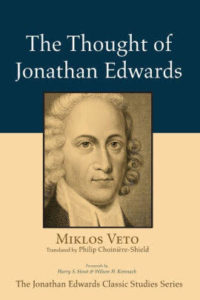
Miklos Veto, The Thought of Jonathan Edwards (The Jonathan Edwards CLassic Studies Series). Translated by Philip Choinière-Schield. Eugene, OR: Wipf & Stock, 2021. 520 pp. $ 55.00 paperback. [Review by Dr. Marco Barone]
Miklos Veto (Budapest, 1936 – Paris, 2020) was a prolific Roman Catholic philosopher and Holocaust survivor. His publications include many topics and figures of the history of philosophy (especially, but not exclusively, German idealism), philosophy of religion, and Christian metaphysics. The Thought of Jonathan Edwards is the fruit of one of the author’s many interests.
The volume consists of an Introduction, eight chapters, a conclusion, and two appendixes (plus some research tools). Veto thinks that there are three major “spheres” or “simultaneously co-existing realism of reflection” (1) that connect Edwards’ vast corpus: being and grace (chapter 1), the will (chapters 2 to 4), and knowledge (chapter 5 to 8).
In chapter 1 (being and grace) Veto discusses Edwards’ view on “the realm of being,” more specifically, “the mutual relations between God and creature, the difference and identity of infinite being with finite being, and the question of the divine foundation of Creation” (2). From a metaphysical point of view, Veto believes that “the foundation of knowing also falls within this realm” of being and grace. However, that fall of mankind into sin in Adam resulted in that “an unbroken passage from being to knowing is rendered impracticable by the will or, more specifically, by the fact that the created will is fallen right from the beginning” (2). Therefore, it is necessary, Veto says, to extensively study the nature of man’s will before dedicating our attention to epistemology proper.
In chapters 2 to 4 (the will,) Veto expounds on Edwards’ view of “the fallen will and the various forms that its subjugation to evil assumes” (2). Sin, it has to be remembered, has not only ethical consequences but also ontological ones: “The effect of the fall is felt even within the realm of being, where it provides an opportunity, so to speak, to characterize creative goodness as redemptive grace” (2)
Chapters 5 to 8 (knowledge) add that the fall also had epistemological effects on mankind: “The third realm of Edwards’s thought, initially appears in a form or rather at a level determined by the Fall, functioning within the world of sin” (2). It is when, and only when, God in Christ is included in the discussion that knowledge “assumes in its regenerate form, having attained an intuitive and complete grasp of reality, the primary beauty that constitutes the essence and brilliance of God and divine things” (2).
Veto’s intent is to offer a comprehensive intermediate-advanced exposition of Edwards’ philosophical theology. I emphasize “philosophical theology” because of one of Veto’s underlying assumptions and adamant convictions that is at play throughout the entire work.
There are innumerable examples of the interpenetration of philosophy and theology in the Treatises and Miscellanies, in the Sermons and Discourses … Philosophy and religion cannot be separated, read and understood in isolation from one another. Someone interested in his dogmatics or analysis of religious experience can scarcely separate the philosophy from his theological developments. Conversely, how can we understand his philosophical issues if we skip over their theological context? Philosophy and religion are definitely different paths to the truth and may well target different intentional objects. The work of Jonathan Edwards attests to the fact that these two discourses are inseparable. (408)
This point is important to single out, over against any attempt to expound and judge Edwards’ philosophy out of the context of his theology, which, by the very nature of Edwards’ thought, is inevitably going to be myopic and incomplete.
Relatedly, Veto’s work is not only comprehensive in scope, but also masterful in execution. Veto demonstrates a great knowledge of Edwards’ numerous writings, he brings together Edwards’ theological and philosophical themes into an intelligible whole, and directs those themes in a way that shows the harmony, consistency, and beauty of Edwards’ God-centered philosophy. It is far from easy to produce (even using many pages) a comprehensive exposition of that vast and overwhelming intellectual cathedral which is Edwards’ theocentric philosophical mind. Veto has offered just that. Away from the tradition of analytic philosophy, which too often fixates on dissecting parts, prepositions, statements without considering the broader contexts and in isolation from the whole, this Hungarian-born French Idealist philosopher has shown a depth of sympathetic understanding of Edwards’s views which is not too often seen.
Another characteristic of this book which deserves mention is that Veto often compares, contrasts, and integrates Edwards with some of the major figures of western philosophy (Augustine, Thomas Aquinas, Luther, Calvin, Leibniz, Malebranche, Kant, only to name some of the most well known). This is not to be underestimated, because this will help give Edwards the place which he rightfully deserves among the greatest minds of Western thought.
I have, of course, disagreements (for instance, 162, 164, 185, 195-197, 328), but even those hardly decrease the helpfulness of this volume. The editors and the translator (and, of course, Veto himself) need to be thanked for offering this gem to the English speaking world. I strongly recommend it.